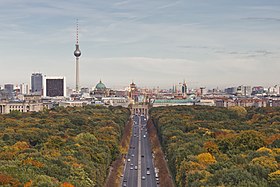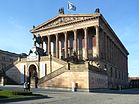Berlin
The "Scots" that wis uised in this airticle wis written bi a body that haesna a guid grip on the leid. Please mak this airticle mair better gin ye can. (Januar 2021) |
Berlin | ||||||||
|---|---|---|---|---|---|---|---|---|
Frae tap: Skyline includin the TV Tower, Brandenburg Gate, Berlin Internaitional Film Festival, East Side Gallery (Berlin Waw), Alte Nationalgalerie, Reichstag bigin (Bundestag) | ||||||||
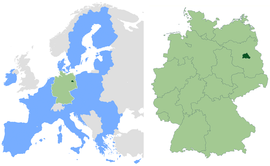 Location within European Union an Germany | ||||||||
| Coordinates: 52°30′2″N 13°23′56″E / 52.50056°N 13.39889°ECoordinates: 52°30′2″N 13°23′56″E / 52.50056°N 13.39889°E | ||||||||
| Kintra | Germany | |||||||
| Govrenment | ||||||||
| • Govrenin Mayor | (SPD) | |||||||
| • Govrening pairties | SPD / CDU | |||||||
| • Bundesrat votes | 4 (o 69) | |||||||
| Area | ||||||||
| • Ceety | 891.85 km2 (344.35 sq mi) | |||||||
| Elevation | 34 m (112 ft) | |||||||
| Population (December 2014)[1] | ||||||||
| • Ceety | 3,562,166 | |||||||
| • Density | 4,000/km2 (10,000/sq mi) | |||||||
| Time zone | UTC+1 (CET) | |||||||
| • Summer (DST) | UTC+2 (CEST) | |||||||
| Postal code(s) | 10001–14199 | |||||||
| Area code(s) | 030 | |||||||
| ISO 3166 code | DE-BE | |||||||
| Vehicle registration | B (for earlier signs see note)[2] | |||||||
| GDP/ Nominal | €94.7 billion (2010) [3] | |||||||
| NUTS Region | DE3 | |||||||
| Website | berlin.de | |||||||
Berlin is the caipital city o Germany an is ane o the 16 states o Germany. Wi a population o 3.45 million fowk, Berlin is Germany's maistmuckle city. It is the seicont maist populous ceety proper an the seivent maist populous urban airt in the European Union.
History
[eedit | eedit soorce]Etymology
[eedit | eedit soorce]The origin o the name Berlin is uncertain. It mey hae its ruits in the leid o Wast Slavic indwallers o the area o the day's Berlin, an mey be relatit tae the Auld Polabian stem berl-/birl- ("swamp").[4] Fowk etymology connects the name tae the German wird for beir, Bär. A beir appears in the coat o airms o the city.[5]
12t tae 16t centuries
[eedit | eedit soorce]
The earliest evidence o settlements in the area o the day's Berlin are a widden rod datit frae approximately 1192[6] an leftowers o widden hoosepairts datit tae 1174 foond in a 2012 diggin in Berlin Mitte.[7] The first written records o touns in the area o present-day Berlin date frae the late 12t century. Spandau is first mentioned in 1197 an Köpenick in 1209, althou thir area did nae jyn Berlin till 1920.[8] The central pairt o Berlin can be traced back tae twa touns. Cölln on the Fischerinsel is first mentioned in a 1237 document, an Berlin, athort the Spree in what is nou cried the Nikolaiviertel, is referenced in a document frae 1244.[6] The umwhile (1237) is considered tae be the foondin date o the city.[9] The twa touns ower time formed close economic an social ties. In 1307 thay formed an alliance wi a common external policy, thair internal admeenistrations still bein separatit.[10][11]
In 1415, Frederick I acame the elector o the Margraviate o Brandenburg, which he ruled till 1440.[12] During the 15t century his successors wad establish Berlin-Cölln as caipital o the margraviate, an subsequent members o the Hohenzollern faimily ruled till 1918 in Berlin, first as electors o Brandenburg, then as kings o Proushie, an eventually as German emperors. In 1443, Frederick II Airntuith stairtit the construction o a new ryal palace in the twin city Berlin-Cölln. The protests o the toun ceetizens against the biggin culminatit in 1448, in the "Berlin Indignation" ("Berliner Unwille").[13][14] This protest wis nae successfu, houever, an the ceetizenry lost mony o its poleetical an economic privileges. Efter the ryal palace wis finished in 1451, it gradually came intae uise. Frae 1470, wi the new elector Albrecht III Achilles, Berlin-Cölln acame the new ryal residence.[11] Offeecially, the Berlin-Cölln palace acame permanent residence o the Brandenburg electors o the Hohenzollerns frae 1486, when John Cicero came tae power.[15] Berlin-Cölln, houiver, haed tae gie up its status as a free Hanseatic city. In 1539, the electors an the city offeecially became Lutheran.[16]
17t tae 19t centuries
[eedit | eedit soorce]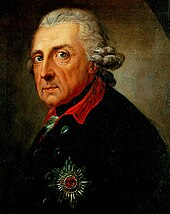
The Thirty Years' War atween 1618 an 1648 devastatit Berlin. Ane third o its hooses war damaged or destroyed, an the city lost hauf o its population.[17] Frederick William, kent as the "Great Elector", that haed succeedit his faither George William as ruler in 1640, initiatit a policy o promotin immigration an releegious tolerance.[18] Wi the Edict o Potsdam in 1685, Frederick William offered asylum tae the French Huguenots.[19] Bi 1700, approximately 30 percent o Berlin's residents war French, acause o the Huguenot immigration.[20] Mony ither immigrants came frae Bohemie, Poland, an Salzburg.[21]

Syne 1618, the Margraviate o Brandenburg haed been in personal union wi the Duchy o Proushie. In 1701, houever, the dual state formed the Kinrick o Proushie, as Frederick III, Elector o Brandenburg nou crouned himsel as king Frederick I in Proushie. Berlin acame the caipital o the new Kinrick. This wis a successfu attempt tae centralise the caipital in the very ootspread state, an it wis the first time the city began tae grow. In 1709 Berlin merged wi the fower ceeties o Cölln, Friedrichswerder, Friedrichstadt an Dorotheenstadt unner the name Berlin, "Haupt- und Residenzstadt Berlin".[10]
In 1740, Frederick II, kent as Frederick the Great (1740–1786), came tae pouer.[22] Unner the rule o Frederick II, Berlin acame a centre o the Enlichtenment.[23] Follaein Fraunce's veectory in the War o the Fowert Coaleetion, Napoleon Bonaparte mairched intae Berlin in 1806, but grantit sel-govrenment tae the city.[24] In 1815, the city acame pairt o the new Province o Brandenburg.[25]
The Industrial Revolution transformed Berlin during the 19t century; the city's economy an population expandit dramatically, an it acame the main railwey hub an economic centre o Germany. Addeetional suburbs suin developed an increased the area an population o Berlin. In 1861, neighborin suburbs includin Wedding, Moabit an several ithers war incorporatit intae Berlin.[26] In 1871, Berlin acame caipital o the newly foondit German Empire.[27] In 1881, it acame a city destrict separate frae Brandenburg.[28]
20t tae 21st centuries
[eedit | eedit soorce]
In the early 20t century, Berlin haed acome a fertile grund for the German Expressionist movement.[29] In fields such as airchitectur, pentin an cinema new forms o airteestic styles war inventit. At the end o Warld War I in 1918, a republic wis proclaimed bi Philipp Scheidemann at the Reichstag biggin. In 1920, the Greater Berlin Act incorporatit dozens o suburban ceeties, veelages, an estates aroond Berlin intae an expandit city. The act increased the area o Berlin frae 66 tae 883 km2 (25 tae 341 sq mi). The population almaist doubled an Berlin haed a population o aroond fower million. During the Weimar era, Berlin unnerwent poleetical unrest due tae economic uncertainties, but acame a renained centre o the Roarin Twenties an aa. The metropolis experienced its heyday as a major warld caipital an wis kent for its leadership roles in science, technology, the humanities, city plannin, film, heicher eddication, govrenment, an industries. Albert Einstein rose tae public prominence during his years in Berlin, bein awairdit the Nobel Prize for Pheesics in 1921.

In 1933, Adolf Hitler an the Nazi Pairty came tae pouer. NSDAP rule effectively destroyed Berlin's Jewish community, which haed nummered 160,000, representin ane-third o aw Jews in the kintra. Berlin's Jewish population fell tae aboot 80,000 as a result o emigration atween 1933 an 1939. Efter Kristallnacht in 1938, thoosands o the city's persecutit groups war imprisoned in the nearby Sachsenhausen concentration camp or, stairtin in early 1943, war shipped tae death camps, such as Auschwitz.[30] During Warld War II, muckle pairts o Berlin war destroyed in the 1943–45 air raids an during the Battle o Berlin. Aroond 125,000 ceevilians war killed.[31] Efter the end o the war in Europe in 1945, Berlin received lairge nummers o refugees frae the Eastren provinces. The victorious pouers dealt the city intae fower sectors, analogous tae the occupation zones intae which Germany wis dividit. The sectors o the Wastren Allies (the Unitit States, the Unitit Kinrick an Fraunce) formed Wast Berlin, while the Soviet sector formed East Berlin.[32]
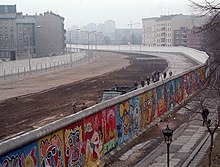
Aw fower Allies shared admeenistrative responsibilities for Berlin. Houever, in 1948, when the Wastren Allies extendit the siller reform in the Wastren zones o Germany tae the three wastren sectors o Berlin, the Soviet Union imposed a blockade on the access routes tae an frae Wast Berlin, which lay entirely inside Soviet-controlled territory. The Berlin airlift, conductit bi the three wastren Allies, owercame this blockade bi supplyin fuid an ither supplies tae the city frae Juin 1948 tae Mey 1949.[33] In 1949, the Federal Republic o Germany wis foondit in Wast Germany an eventually includit aw o the American, Breetish, an French zones, excludin those three kintras' zones in Berlin, while the Marxist-Leninist German Democratic Republic wis proclaimed in East Germany. Wast Berlin offeecially remained an occupied city, but it poleetically wis aligned wi the Federal Republic o Germany despite Wast Berlin's geografic isolation. Airline service tae Wast Berlin wis grantit anly tae American, Breetish, an French airlines.

The foondin o the twa German states increased Cauld War tensions. Wast Berlin wis surroondit bi East German territory, an East Germany proclaimed the Eastren pairt as its caipital, a muiv that wis nae recognised bi the wastren powers. East Berlin included maist o the historic centre o the city. The Wast German govrenment established itsel in Bonn.[34] In 1961, East Germany began the biggin o the Berlin Waw atween East an Wast Berlin, an events escalatit tae a tank staundoff at Checkpoint Charlie. Wast Berlin wis nou de facto a pairt o Wast Germany wi a unique legal status, while East Berlin wis de facto a pairt o East Germany. John F. Kennedy gae his "Ich bin ein Berliner" – speech in 1963 unnerlinin the US support for the Wastren pairt o the city. Berlin wis completely dividit. Althou it wis possible for Wastreners tae pass frae ane tae the ither side throu strictly controlled checkpynts, for maist Eastreners traivel tae West Berlin or Wast Germany wis prohibitit. In 1971, a Fower-Pouer agreement guaranteed access tae an frae Wast Berlin bi caur or train throu East Germany.[35]
In 1989, wi the end o the Cauld War an pressur frae the East German population, the Berlin Waw fell on 9 November an wis subsequently maistly demolished. The day, the East Side Gallery preserves a muckle portion o the Waw. On 3 October 1990, the twa pairts o Germany war reunified as the Federal Republic o Germany, an Berlin again acame the offeecial German caipital. In 1991, the German Pairlament, the Bundestag, votit tae muive the seat o the (Wast) German caipital frae Bonn tae Berlin, which wis completit in 1999. Berlin's 2001 admeenistrative reform merged several destricts. The nummer o boroughs wis reduced frae 23 tae 12. In 2006, the FIFA Warld Cup Final wis held in Berlin.
Politics
[eedit | eedit soorce]Burghs
[eedit | eedit soorce]
Berlin is subdividit intae twal burghs (Bezirke), doun frae 23 burghs afore Berlin's 2001 admeenistrative reform. Each borough contains a nummer o localities (Ortsteile), which aften hae historic ruits in aulder municipalities that predate the formation o Greater Berlin on 1 October 1920 an became urbanized an incorporatit intae the ceety. Mony residents strangly identifee wi thair localities or burghs. At present Berlin consists o 95 localities, which are commonly made up o several ceety neighborhuids—cried Kiez in the Berlin dialect—representin sma residential area.
Each burgh is govrened bi a burgh cooncil (Bezirksamt) consistin o five cooncilors (Bezirksstadträte) an a burgh mayor (Bezirksbürgermeister). The burgh cooncil is electit bi the burgh assembly (Bezirksverordnetenversammlung). The burghs o Berlin are no independent municipalities, housomeivver. The pouer o burgh govrenments is limitit an subordinate tae the Senate o Berlin. The burgh mayors form the cooncil o mayors (Rat der Bürgermeister), led bi the ceety's govrenin mayor, which advises the senate.
The localities hae nae local govrenment bodies, an the admeenistrative duties o the umwhile locality representative, the Ortsvorsteher, wur taken ower bi the burgh mayors.
Sister ceeties
[eedit | eedit soorce]Berlin maintains offeecial pairtnerships wi 17 ceeties.[36] Town twinnin atween Berlin an ither ceeties began wi Los Angeles in 1967. East Berlin's pairtnerships wur canceled at the time o German reunification an later pairtially reestablished. Wast Berlin's pairtnerships haed previously been restrictit tae the borough level. Durin the Cauld War era, the pairtnerships haed reflectit the different power blocs, wi Wast Berlin pairtnerin wi caipitals in the Wast, an East Berlin maistly pairtnerin wi ceeties frae the Warsaw Pact an its allies.
Thare are several joint projects wi mony ither ceeties, such as Copenhagen, Helsinki, Johannesburg, Shanghai, Seoul, Sofia, Sydney, an Vienna. Berlin participates in internaitional ceety associations such as the Union o the Caipitals o the European Union, Eurocities, Netwirk o European Ceeties o Cultur, Metropolis, Summit Conference o the Warld's Major Ceeties, Conference o the Warld's Caipital Ceeties. Berlin's offeecial sister ceeties are:[36]
|
Notable fowk
[eedit | eedit soorce]- Alexander von Humboldt
- Marlene Dietrich, German actress an sangster
- Wilhelm II, German Emperor
References
[eedit | eedit soorce]- ↑ "Amt für Statistik Berlin Brandenburg". Amt für Statistik Berlin-Brandenburg (in German). 2014. Retrieved 5 Mairch 2015.
- ↑ Prefixes for vehicle registration wur introducit in 1906, but aften chyngit due tae the poleetical chynges efter 1945. Vehicles wur registered unner the follaein prefixes: "I A" (1906– Aprile 1945; devalidatit on 11 August 1945); no prefix, anerlie digits (syne Julie till August 1945), "БГ" (=BG; 1945–1946, for caurs, lorries an busses), "ГФ" (=GF; 1945–1946, for caurs, lorries an busses), "БМ" (=BM; 1945–1947, for motor bikes), "ГМ" (=GM; 1945–1947, for motor bikes), "KB" (i.e.: Kommandatura of Berlin; for aw o Berlin 1947–1948, continued for Wast Berlin till 1956), "GB" (i.e.: Greater Berlin, for East Berlin 1948–1953), "I" (for East Berlin, 1953–1990), "B" (for Wast Berlin as o 1 Julie 1956, continued for aw o Berlin syne 1990).
- ↑ "Bruttoinlandsprodukt (nominal) in BERLIN seit 1995" (PDF) (in German). 30 Mairch 2010. Archived frae the original (PDF) on 12 Juin 2011. Retrieved 15 Mey 2011.
- ↑ Berger, Dieter (1999). Geographische Namen in Deutschland. Bibliographisches Institut. ISBN 3-411-06252-5.
- ↑ Steven Somers (14 Julie 2008). Those Crazy Germans!: A Lighthearted Guide to Germany. Xlibris Corporation. p. 12. ISBN 978-1-4535-6595-7.
- ↑ a b "Berlin dig finds city older than thought". Associated Press.
|access-date=requires|url=(help) - ↑ "Berlin ist älter als gedacht: Hausreste aus dem Jahr 1174 entdeckt". dpa. Retrieved 24 August 2012.
- ↑ "Spandau Citadel". Berlin tourist board. Archived frae the original on 12 Juin 2008. Retrieved 18 August 2008.
- ↑ "The medieval trading center". www.berlin.de. Retrieved 11 Juin 2013.
- ↑ a b Stöver B. Geschichte Berlins. Verlag CH Beck, 2010. ISBN 978-3-406-60067-8
- ↑ a b Stadtgründung Und Frühe Stadtentwicklung, Luisenstädtischer Bildungsverein. Retrieved 10 June 2013
- ↑ "The Hohenzollern Dynasty". Antipas. Archived frae the original on 7 August 2007. Retrieved 18 August 2008. Archived 2007-08-07 at the Wayback Machine
- ↑ Berliner Unwillen. Verein für die Geschichte Berlins e. V. Retrieved 30 May 2013
- ↑ Was den "Berliner Unwillen" erregte.. Der Tagesspiegel, 26 Oktober 2012
- ↑ "The electors' residence". www.berlin.de. Retrieved 11 Juin 2013.
- ↑ "Berlin Cathedral". SMPProtein. Archived frae the original on 18 August 2006. Retrieved 18 August 2008.
- ↑ "Brandenburg during the 30 Years War". WHKMLA. Retrieved 18 August 2008.
- ↑ Thomas Carlyle (1853). Fraser's Magazine. J. Fraser. p. 63.
- ↑ W. Gunther Plaut (1 Januar 1995). Asylum: A Moral Dilemma. Greenwood Publishing Group. p. 42. ISBN 978-0-275-95196-2.
- ↑ Jeremy Gray (2007). Germany. Lonely Planet. p. 49. ISBN 978-1-74059-988-7.
- ↑ Roman Adrian Cybriwsky (23 Mey 2013). Capital Cities around the World: An Encyclopedia of Geography, History, and Culture: An Encyclopedia of Geography, History, and Culture. ABC-CLIO. p. 48. ISBN 978-1-61069-248-9.
- ↑ Gregorio F. Zaide (1965). World History. Rex Bookstore, Inc. p. 273. ISBN 978-971-23-1472-8.
- ↑ Marvin Perry; Myrna Chase; James Jacob; Margaret Jacob; Theodore Von Laue (1 Januar 2012). Western Civilization: Ideas, Politics, and Society. Cengage Learning. p. 444. ISBN 1-133-70864-1.
- ↑ Peter B. Lewis (15 Februar 2013). Arthur Schopenhauer. Reaktion Books. p. 57. ISBN 978-1-78023-069-6.
- ↑ Harvard Student Agencies Inc. Staff; Harvard Student Agencies, Inc. (28 December 2010). Let's Go Berlin, Prague & Budapest: The Student Travel Guide. Avalon Travel. p. 83. ISBN 1-59880-914-8. Archived frae the original on 14 September 2015. Retrieved 23 Julie 2015.
- ↑ Andrea Schulte-Peevers (15 September 2010). Lonel Berlin. Lonely Planet. p. 25. ISBN 978-1-74220-407-9.
- ↑ Bernd Stöver (2 October 2013). Berlin: A Short History. C.H.Beck. p. 20. ISBN 978-3-406-65633-0.
- ↑ W. Paul Strassmann (15 Juin 2008). The Strassmanns: Science, Politics and Migration in Turbulent Times (1793-1993). Berghahn Books. p. 26. ISBN 978-1-84545-416-6.
- ↑ Jack Holland; John Gawthrop (2001). The Rough Guide to Berlin. Rough Guides. p. 361. ISBN 978-1-85828-682-2.
- ↑ Berlin
- ↑ Clodfelter, Michael (2002), Warfare and Armed Conflicts- A Statistical Reference to Casualty and Other Figures, 1500–2000 (2nd ed.), McFarland & Company, ISBN 0-7864-1204-6
- ↑ "Agreement to divide Berlin". FDR-Library. Retrieved 18 August 2008.
- ↑ "Berlin Airlift / Blockade". Western Allies Berlin. Retrieved 18 August 2008.
- ↑ "Berlin official website; History after 1945". City of Berlin. Retrieved 8 Apryle 2009.
- ↑ "Ostpolitik: The Quadripartite Agreement of September 3, 1971". US Berlin Embassy. Retrieved 18 August 2008.
- ↑ a b "Berlin's international city relations". Berlin Mayor's Office. Archived frae the original on 8 September 2010. Retrieved 22 August 2010.
- ↑ "Miasta partnerskie Warszawy". um.warszawa.pl. Biuro Promocji Miasta. 4 Mey 2005. Archived frae the original on 11 October 2007. Retrieved 29 August 2008.
Freemit airtins
[eedit | eedit soorce]| Wikimedia Commons haes media relatit tae Berlin. |

